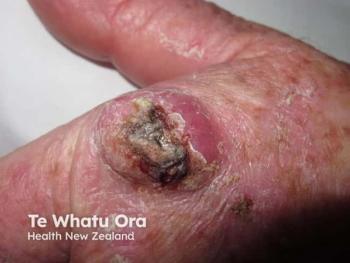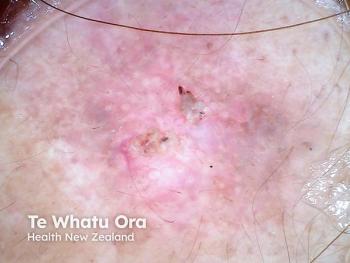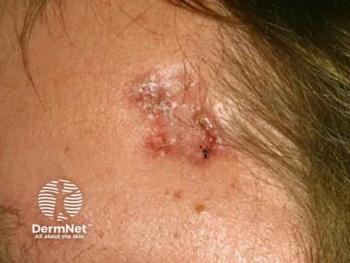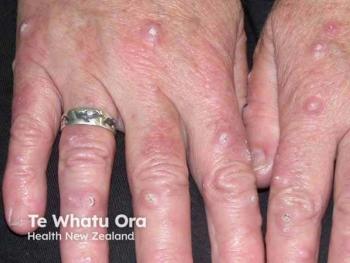
- Dermatology Times, December 2019 (Vol. 40, No. 12)
- Volume 40
- Issue 12
Diet may impact squamous cell carcinoma risk
Fruits and vegetables rich in vitamin A appear to play a significant role in helping to decrease the incidental risk of developing squamous cell carcinoma, according to a recent study.
A diet heavy on fruits and vegetables rich in vitamin A may help lower the risk of developing squamous cell carcinoma (SCC), according to the
Essential in the maintenance of epithelial maturation and differentiation, vitamin A and the retinoids can be divided into pre-formed vitamin A (retinol), if animal based, and provitamin A carotenoid, if plant based, including beta carotene, alpha carotene and beta cryptoxanthin - all of which can be converted to retinol in the body.
Eunyoung Cho, Sc.D., and fellow colleagues from the department of dermatology, Warren Alpert Medical School of Brown University, Providence, RI, recently conducted a prospective study looking at whether vitamin A intake is associated with a reduction in SCC risk. The cohort study examined the intake of vitamin A and carotenoids and SCC risk in the Nurses’ Health Study (1984-2012) and the Health Professionals Follow-up Study (1986-2012), including a total of 75,100 women (mean age 50.4 years) and 48,400 men (mean age 54.3 years).
Researchers found a total of 3,978 cases of SCC in the Nurses’ Health Study and Health Professionals Follow-up Study combined. Data showed that a higher vitamin A intake mostly derived from fruits and vegetables was associated with a lower risk of the development of SCC.
“In the population we studied, the intake of vitamin A was largely achieved by plant sources. We believe that fruits and vegetables are associated with numerous other health benefits and should be an integral part of every daily healthy diet anyway. Perhaps our results can serve as a wakeup call as to the significant health benefits of dietary vitamin A including skin cancer prevention,” says Dr. Cho, senior author of the study.
Study data showed that with quintile 1 as the reference, the pooled multivariate hazard ratios for the increasing quintiles of vitamin A intake were 0.97 for quintile 2, 0.97 for quintile 3, 0.93 for quintile 4, and 0.83 for quintile 5. Higher intakes of retinol and some carotenoids were also associated with a reduction in SCC risk. Here, the pooled hazard ratios for the highest quintiles of intake compared with the lowest quintiles were 0.88 for total retinol, 0.86 for beta cryptoxanthin, 0.87 for lycopene, and 0.89 for lutein and zeaxanthin.
“Our study demonstrates that vitamin A has a protective role against the development of SCC. Nevertheless, more research is needed to understand the appropriate level of vitamin A intake for maximum health benefits. Until then, I believe that patients should enjoy the nutritional benefits of fruits and vegetables unless their dietician voices any contraindication for these,” Dr. Cho says. Â
References:
1. Kim J, Park MK, Li WQ, Qureshi AA, Cho E. Association of Vitamin A Intake with Cutaneous Squamous Cell Carcinoma Risk in the United States. JAMA Dermatol. 2019 Jul 31. doi: 10.1001/jamadermatol.2019.1937.
2. Moon TE, Levine N, Cartmel B, et al; Southwest Skin Cancer Prevention Study Group. Effect of retinol in preventing squamous cell skin cancer in moderate-risk subjects: a randomized, double-blind, controlled trial. Cancer Epidemiol Biomarkers Prev. 1997;6(11):949-956.
3. Asgari MM, Chren MM, Warton EM, Friedman GD, White E. Supplement use and risk of cutaneous squamous cell carcinoma. J Am Acad Dermatol. 2011; 65(6):1145-1151. doi:10.1016/j.jaad.2010.09.009
Articles in this issue
about 6 years ago
Genetic expression testing still a work in progress for melanomaabout 6 years ago
New resource for teens with atopic dermatitisabout 6 years ago
When is the right time to retire?about 6 years ago
40 years of champions in dermatologyabout 6 years ago
A novel target for rosacea treatmentabout 6 years ago
Should dermatologists embrace AI?about 6 years ago
Spironolactone efficacy may be similar to oral antibiotic Txabout 6 years ago
Hair growth treatmentsNewsletter
Like what you’re reading? Subscribe to Dermatology Times for weekly updates on therapies, innovations, and real-world practice tips.











